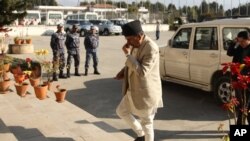Nepal and Maoist rebels have struck a peace deal that will lead to the formation of a new government, after nearly six months of political deadlock.
The Nepalese government and the main opposition Maoists agreed Friday to set up a six-member body that will look after the main parts of the peace agreement. The committee will have three members from Nepal's main political parties and three members from the Maoist party.
Madhav Kumar Nepal, the country's last prime minister who now heads the caretaker government, has hailed the agreement as an important step in the peace process.
The new deal was settled just days before a United Nations peace mission exits the country. The four-year mission in Nepal officially ends Saturday. U.N. officials were called in four years ago to monitor a year-long transition to peace after a decade-long insurgency. The U.N. was responsible for monitoring arms and ammunition as well as military personnel.
Under the new peace agreement, the committee will supervise the monitoring of arms and ammunition in the country and ensure nearly 19,000 rebel soldiers are reintegrated into the Nepalese military.
U.S. Assistant Secretary of State for South Asia Robert Blake has urged Nepalese and Maoist leaders to respect their commitments to peace, a spokesman for the State Department said Friday.
Nepal's political crisis took a turn Wednesday when the sole candidate, Ram Chandra Poudel, withdrew from the race for prime minister after 16 failed attempts to win the support of parliament. Nepal has been trying to elect a new prime minister since June 30, 2010, when then-Prime Minister Nepal resigned under pressure from the Maoists.
The Maoists joined Nepal's political process in 2006 under a peace deal that ended a decade-long insurgency. The current political stalemate has stalled the peace process and delayed efforts to draft a new constitution.
Nepal, Rebels Strike New Government Deal




